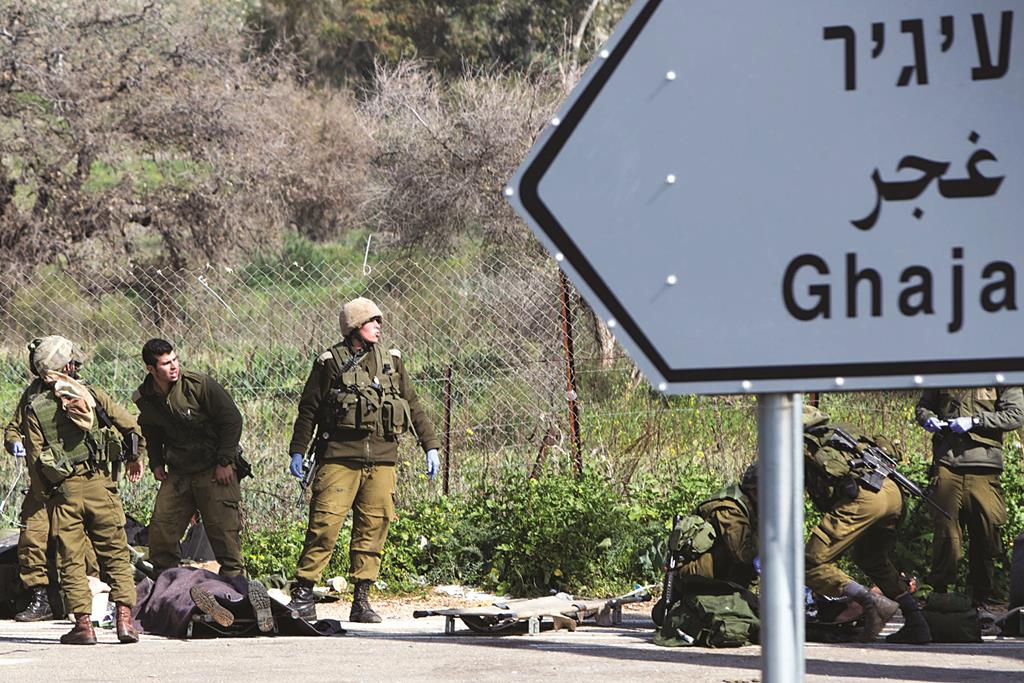Two IDF Soldiers Killed, Seven Hurt in Hizbullah Attack



Ten days of tension on the northern front erupted in flames and death on Wednesday morning, as a Hizbullah rocket attack on an IDF army convoy near the Lebanese border killed two soldiers and wounded seven others.
The IDF retaliated with at least 45 artillery shells aimed at five separate Hizbullah targets across the Lebanese border.
It was too soon to say whether the incident would escalate into what could become a full-scale conflict or whether, now that Hizbullah can claim its revenge for the death of a high-ranking operative in last week’s air strike in Syria, the situation will settle down.
However, senior officials in Beirut said they received a message from Israel saying that as far as it was concerned, the IDF return-fire ended the matter, and that a similar message was passed to Israel by UNIFIL — that the Hizbullah has exacted its revenge and would not seek further confrontation.
The IDF military vehicles were on a civilian road in the village of Ghajar a mile and a half from the border on the western side of Har Dov when they were ambushed by a salvo of five to six Kornet missiles, a senior army source said. It is believed that they were launched from three to four miles away, inside Lebanon.
A military D-max vehicle and an IDF jeep were targeted and went up in flames at about 11:30 a.m. The fact that they were not armored is an issue that was immediately raised, given the state of high alert near the border, although a direct hit from a missile of this type would have destroyed an armored vehicle as well.
A military source also pointed out that they were traveling on a road used jointly by military and civilian traffic, and that a house in the village was also struck by one of the missiles.
“It’s too soon to draw conclusions about whether the vehicles should have been armored,” the source said. “We will investigate the incident.”
Wednesday’s attack came after air strikes by Israeli jets near the Golan Heights overnight, in response to rocket fire from Syria.
The dead were named as Cap. Yohai Kalangel, Hy”d, 25, from Har Gilo, married with a one-year-old daughter, and Sgt. Dor Haim Nini, Hy”d, 20, of the same unit, from Moshav Shtulim in southern Israel.
“My little brother was always smiling … There’s no situation in which he wasn’t smiling. If he heard of a hungry soldier, he’d always ask for money to give that soldier,” Dor Nini’s brother Aviel said.
“He only arrived in the north last night; he didn’t even have time to understand what was going on …Today, when we heard about the incident we all had a bad feeling straight away. We left work and went home. Without talking to each other, we all felt something bad had happened, and when we got home we were told of the disaster,” Aviel said.
The wounded soldiers were rushed to the Sieff Hospital in Tzfas and the Rambam Hospital in Haifa. Three suffered light to moderate wounds, and the rest were lightly wounded.
A Spanish U.N. peacekeeper was killed in southern Lebanon, apparently caught in the Israeli return fire. “One peacekeeper was killed. We are looking into the circumstances of this tragic incident,” said Andrea Tenenti, spokesman for the United Nations Interim Force in Lebanon (UNIFIL).
Later, it was reported that Foreign Minister Avigdor Lieberman called his Spanish counterpart to apologize for the incident, a source said. “We regret the incident and are in touch with the United Nations,” he added.
Tenenti said the head of UNIFIL was in close contact with all parties and had urged “maximum restraint.”
UNIFIL has more than 10,000 troops in Lebanon, operating alongside Lebanese troops in the south to keep peace near the frontier with Israel and prevent weapons transfers to Hizbullah.
An early report carried by Lebanese media that an Israeli soldier had been captured was strongly denied by the IDF, as it was by a Lebanese political source.
Prime Minister Binyamin Netanyahu cut short a visit to Sderot, where he attended the laying of a cornerstone for a new neighborhood, to hold a security consultation with Defense Minister Moshe Yaalon and other officials at the Defense Ministry headquarters in Tel Aviv.
Netanyahu’s office accused Iran, Hizbullah’s principal backer, of being behind what was described as a “criminal terror attack.”
President Reuven Rivlin cut short his visit to New York by two days to be in Israel with the bereaved families and the wounded, his office said. He was due to arrive back in Israel Thursday afternoon.
Washington was supportive of Israel’s right to self-defense, but said it did not want “an escalation of the situation.”
“The United States strongly condemns Hizbullah’s attack today on Israeli Defense Forces (IDF) near the border between Lebanon and Israel,” said Edgar Vasquez, a State Department spokesman, “in blatant violation of U.N. Security Council Resolution 1701.”
“We call upon all parties to avoid any action that would jeopardize the long-held cease-fire between Israel and Syria and abide by the 1974 disengagement of forces agreement,” State Department spokesman Jen Psaki said.
In Beirut, celebratory gunfire rang out upon news of the attack, while residents in the southern suburbs of the city, a Hizbullah stronghold, prepared to evacuate. Their neighborhoods were heavily bombed by Israel in 2006.
This article appeared in print on page 1 of edition of Hamodia.
To Read The Full Story
Are you already a subscriber?
Click "Sign In" to log in!

Become a Web Subscriber
Click “Subscribe” below to begin the process of becoming a new subscriber.

Become a Print + Web Subscriber
Click “Subscribe” below to begin the process of becoming a new subscriber.

Renew Print + Web Subscription
Click “Renew Subscription” below to begin the process of renewing your subscription.












